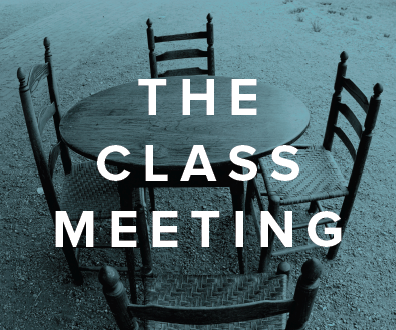This past weekend I finished teaching the Wesleyan Movement for the Course of Study School at Wesley Theological Seminary in Washington D.C. Teaching this material is always a blessing to me. I appreciate being able to teach United Methodists about the history of British and American Methodism. I really enjoy walking students through the Wesleyan Way of Salvation and talking with them about the ways in which Wesleyans should have the most daring, audacious proclamation of the possibilities for new life that are available in Christ of anyone anywhere. I also enjoy talking about the ways in which the message of holiness was complemented by a method for cooperating with God’s grace.
Anyone who knows me will not be surprised to hear that my discussion of the method of early Methodism spent a considerable amount of time on the class meeting, which was a group of roughly 7-12 people who discussed the present state of their relationship with God.
As I talked about Methodist doctrine and discipline, something began to shift in the class. The students, who are all currently serving as pastors of local churches, became increasingly passionate that what they were learning must have an impact on their churches, and on The United Methodist Church.
What seemed to resonate with the students more than anything else was a burden to return to something like the class meeting.
Spending time with a group of United Methodist pastors who were hungry to find ways to return to the class meeting in their churches was a thrill! It was also a blessing to see the passion, energy, and giftedness that these local church pastors have been given by God.
For a number of years, I have had a sense that the time had come to reclaim the Wesleyan class meeting in contemporary Methodism. This sense led me to write The Class Meeting: Reclaiming a Forgotten (and Essential) Small Group Experience, which releases today. Even as I write this, I am both excited and nervous. I am excited because I have seen so many signs that God is at work and that people are ready to return to this practice. I am nervous because it feels like I have climbed out a bit on a limb in writing this book and in stating my conviction that if we reclaim the class meeting that the Holy Spirit will use it to bring renewal to people’s lives, even those who have been longtime members of Methodist churches.
Someone reading this may be wondering: Why are you so confident that a return to the class meeting would be a means of renewal for Methodists and Methodism.
Great question, I’m glad you asked!
Too many Methodists have lost touch with the basic reality that to be a Christian means being in a relationship with the living God. If we are in a relationship with the living God, just like any other relationship, we should be able to name things that are happening in that relationship. But, many Methodists simply do not have a vocabulary for giving voice to their ongoing experience of God.
If Methodists need to learn how to experience God and speak of this experience, I can think of no better means to this end than the Wesleyan class meeting.
In the class meeting, people learn how to interpret their lives, every part of it, through the lens of the gospel. They learn, even if by fits and starts, how to speak of God’s present work and presence in their lives. Is there anything that would be more exciting or fulfilling to be a part of, than seeing and hearing people learn to recognize and respond to God’s love for them?
People want to know if Christian faith really does make any difference in day to day living. Approaches to the Christian life that address people at an almost entirely intellectual or cognitive level cannot sufficiently answer the desire people have for an active and living faith that impacts not only their thoughts but also their actions. The class meeting helped early Methodists to become followers of Jesus Christ in word and deed. It helped them grow where they were. It can do the same for people today who want to grow in their faith and in their pursuit of Christ.
The class meeting is a practice whose time has come (again).
—




5 Responses